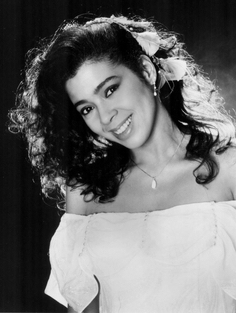
Irene Cara Escalera was an American singer and actress who rose to prominence for her role as Coco Hernandez in the 1980 musical film Fame, and for recording the film's title song "Fame", which reached No. 1 in several countries. In 1983, Cara co-wrote and sang the song "Flashdance... What a Feeling", for which she shared an Academy Award for Best Original Song and won a Grammy Award for Best Female Pop Vocal Performance in 1984.

"Blurry" is a song by American rock band Puddle of Mudd. It was released on October 16, 2001, as the second single from the band's debut album Come Clean (2001). It was 2002's most successful rock song in the United States, topping the Billboard Mainstream Rock and Modern Rock Tracks charts as well as their year-end listings. "Blurry" also found success outside the US, reaching the top 20 in Ireland, New Zealand, and the United Kingdom.
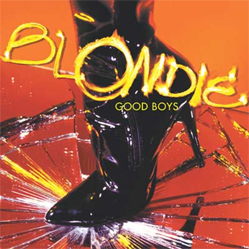
"Good Boys" is a song by American rock band Blondie. Issued on August 11, 2003, it was the only single released from their eighth studio album, The Curse of Blondie (2003). The single was released as part of a two-CD set and on 12-inch vinyl. CD 1 features live versions of "Maria" and "Rapture", plus the video for "Good Boys" directed by Jonas Åkerlund. CD 2 features a remix by Giorgio Moroder. The 12-inch vinyl features remixes by Giorgio Moroder, Arthur Baker, and Scissor Sisters.

"Flashdance... What a Feeling" is a song from the 1983 film Flashdance with music by Giorgio Moroder and lyrics by Keith Forsey and the song's performer, Irene Cara. The song spent six weeks at number one on the Billboard Hot 100 and topped the charts around the world. It was awarded Gold certification by the Recording Industry Association of America for sales of one million copies and won the Academy Award and Golden Globe for Best Original Song and earned Cara the Grammy Award for Best Female Pop Vocal Performance. In 2023, the song was chosen by the Library of Congress for inclusion in the National Recording Registry.

"She Hates Me", originally titled "She Fucking Hates Me", is a song by the American rock band Puddle of Mudd. It was written in 1993 but remained unreleased until 2002 when it became the fourth and final single from the band's debut album Come Clean.
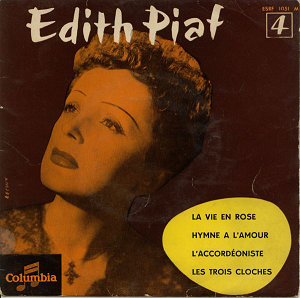
"La Vie en rose" is the signature song of popular French singer Édith Piaf, written in 1945, popularized in 1946, and released as a single in 1947. The song became very popular in the United States in 1950, when seven versions reached the Billboard charts. These recordings were made by Tony Martin, Paul Weston, Bing Crosby, Ralph Flanagan, Victor Young, Dean Martin, and Louis Armstrong.

"You Remind Me" is a song by American singer-songwriter Mary J. Blige. It served as Blige's first single from her debut album, What's the 411? (1992). Written by Eric Milteer and produced by Dave "Jam" Hall, it was originally used on the soundtrack of 1991 comedy film Strictly Business. The song marked Blige's first top forty hit, reaching number twenty-nine on the Billboard Hot 100 and number one on the Hot R&B Singles chart. The music video was released in 1992. The song also sampled Patrice Rushen’s 1982 song, ‘Remind Me’.
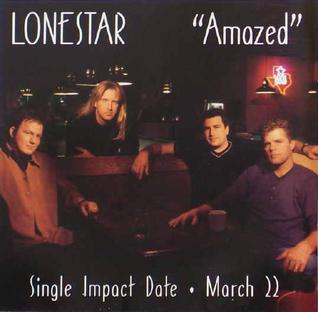
"Amazed" is a song by American country music group Lonestar, released on March 22, 1999, to country radio as the second single from their third studio album Lonely Grill (1999). The power ballad is the band's longest-lasting number one single and biggest hit, spending eight weeks at the top of the Billboard country chart. The song was written by Marv Green, Aimee Mayo, and Chris Lindsey. A pop remix of the song reached number one on the Billboard Hot 100 and number two on the Hot Adult Contemporary Tracks charts in 2000. The song has sold over 1,650,000 digital copies in the US as of February 2016.

"On the Radio" is a song by American singer-songwriter Donna Summer, produced by Italian musician Giorgio Moroder, and released in late 1979 on the Casablanca record label. It was written for the soundtrack to the film Foxes and included on Summer's first international compilation album On the Radio: Greatest Hits Volumes I & II.

"To Love You More" is a song by Canadian singer Celine Dion, written by David Foster and Edgar Bronfman Jr., writing under the pen-name Junior Miles. It was released as a single in Japan on 21 October 1995 and became a hit, reaching number one on the Oricon Singles Chart and selling 1.5 million copies. The lyrics are about a woman who makes an impassioned plea to her lover so that he does not leave her for another woman.

"The Woman in Me" is a song by American singer Donna Summer, released as the third and final single from her eponymous tenth studio album (1982). The song reached number 33 on the Billboard Hot 100, number 30 on the Black Singles chart, and number 17 on the Adult Contemporary chart in early 1983. It was written by John Bettis of Carpenters fame.

What a Feelin' is the second studio album by American singer-songwriter Irene Cara. Released on November 2, 1983, this album is a continuation of the work that Cara began with producer Giorgio Moroder on the soundtrack to the 1983 film Flashdance. The dance-pop song she co-wrote with Moroder and Keith Forsey for the film, "Flashdance... What a Feeling", went to number one on Billboard magazine's Hot 100 and foreshadowed the style of this album, which was unlike her R&B-heavy debut. Although Cara was more accustomed to composing music, she relinquished most of those duties to Moroder here and shifted much of her songwriting focus to lyrics.

"Thank You for Loving Me" is a song by American rock band Bon Jovi. Written by Jon Bon Jovi and Richie Sambora, the song was released on November 6, 2000, as the third single from their seventh studio album, Crush (2000).
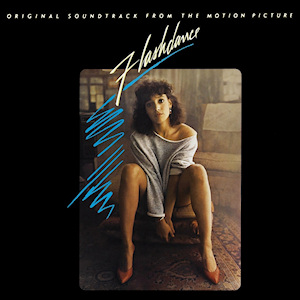
Flashdance: Original Soundtrack from the Motion Picture is the soundtrack to the 1983 film Flashdance, which tells the story of Alex Owens, a welder and exotic dancer who dreams of becoming a professional ballerina. The nightclub performances by Alex and her co-workers and other set pieces involving training and auditioning provided opportunities to present the songs that would make up the soundtrack album. The film's music supervisor, Phil Ramone, made selections that he felt were the best fit for their respective scenes, and composer Giorgio Moroder contributed additional tracks in the process of scoring the film. One of his contributions, "Flashdance...What a Feeling" by Irene Cara, was released as a single in March 1983, weeks before the film's April 15 release, and eventually spent six weeks at number one on the Billboard Hot 100. The soundtrack was released on April 11, 1983 by Casablanca Records.

D.C. Cab: Music from the Original Motion Picture Soundtrack is the soundtrack to the 1983 film D.C. Cab. The producers selected artists for the album who were popular with a young, black audience, and the popularity of one of the film's stars, Mr. T, prompted the film's distributor to release the film four months earlier than planned. D.C. Cab performed poorly at the box office, and the soundtrack peaked at number 181 on the album chart in Billboard magazine.

"No More Words" is a song by American new wave band Berlin from their third studio album, Love Life (1984). It was released on February 27, 1984, as the album's lead single. The single was the band's first top-40 entry on the Billboard Hot 100, peaking at number 23 on May 12, 1984. The song was featured in the 1985 film Vision Quest. In the United States, the song was re-released in 1985 as a B-side to Madonna's single "Crazy for You", which was also featured in Vision Quest.

"Why Me?" is a song written by Giorgio Moroder, Keith Forsey, and the song's performer, Irene Cara, that was the first official single to be released from Cara's 1983 album, What a Feelin', making it the follow-up to the songwriting trio's previous project for Cara, "Flashdance... What a Feeling". This new collaboration, however, was described as having more of a hard rock edge and had lyrics that conveyed the difficulties in a relationship.
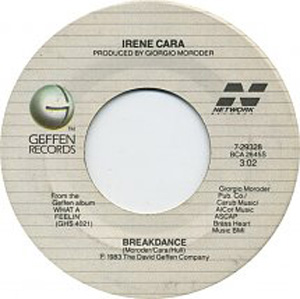
"Breakdance" is a song written by Giorgio Moroder, Bunny Hull, and the song's performer, Irene Cara. Moroder's obsession with the dance hit "Rockit" by Herbie Hancock fueled his composition of the music, and Cara was inspired by the street performers she saw growing up in the South Bronx to write lyrics about what was then called breakdancing. Released in March 1984, it was the third single that originated on her What a Feelin' LP and her first to make the top ten in the US since the album's title track went to number one almost a year earlier. "Breakdance" also charted in several other countries and had a dance remix that was also well received.

"The Dream (Hold On to Your Dream)" is a song written by Giorgio Moroder, Pete Bellotte, and the song's performer, Irene Cara, for the 1983 film D.C. Cab. Although not included on initial pressings of Cara's What a Feelin' LP, the decision to release the film four months earlier than originally slated prompted an arrangement for her album to be reissued with the song. A slightly different version (more noticeable in the intro) was also included on the film's soundtrack album; an edited version was released on the 7-inch single, and the 12-inch single included a much longer dance remix.
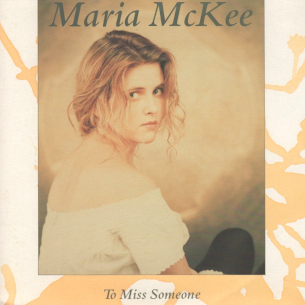
"To Miss Someone" is a song by American singer Maria McKee, released in 1989 as the second single from her debut studio album Maria McKee. The song, written by McKee and produced by Mitchell Froom, was covered by Northern Irish singer Feargal Sharkey in 1991.



















